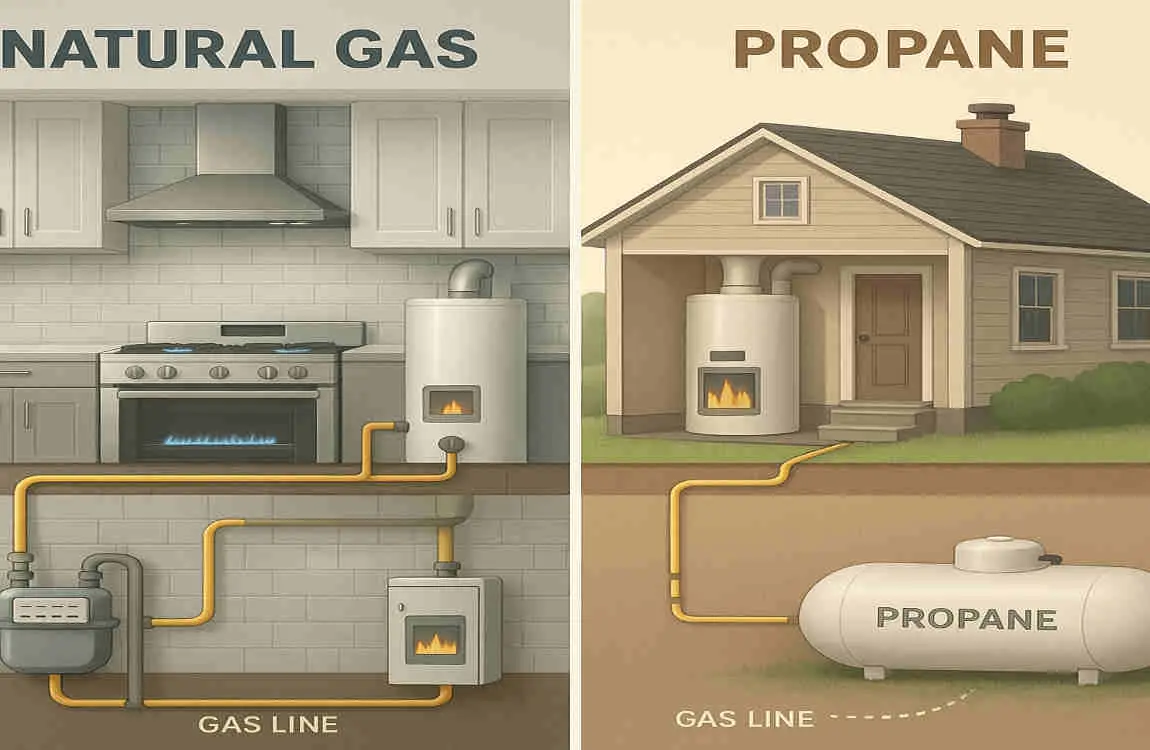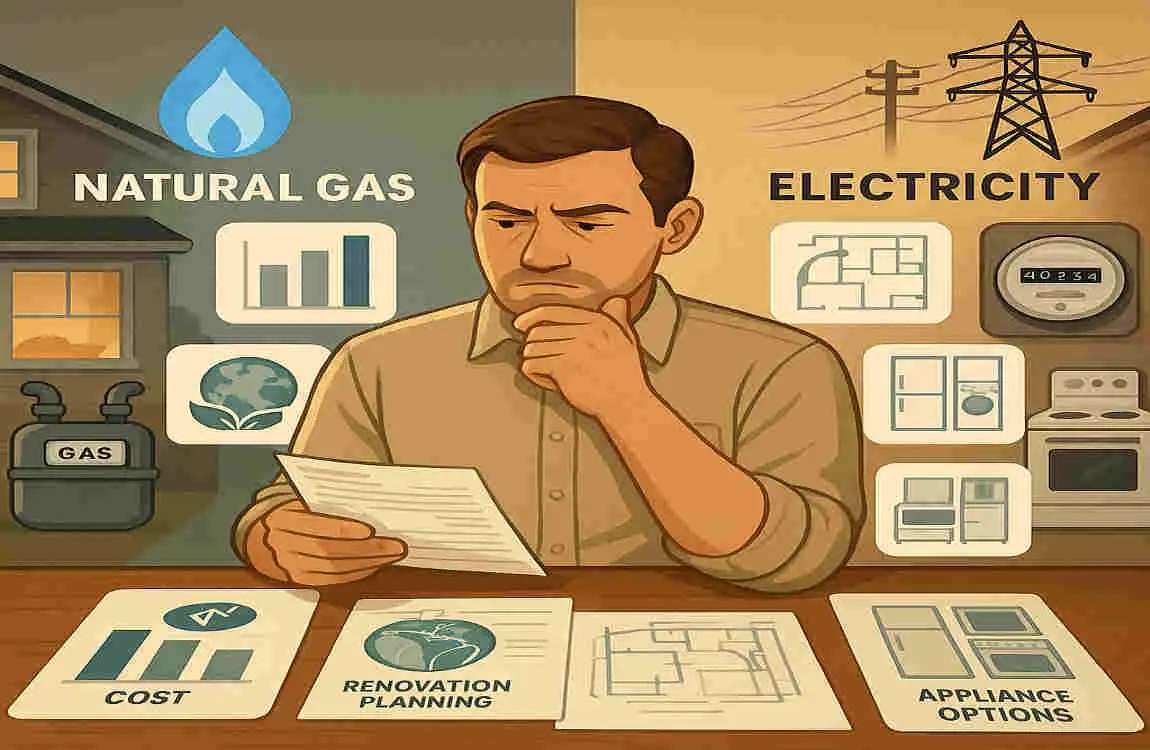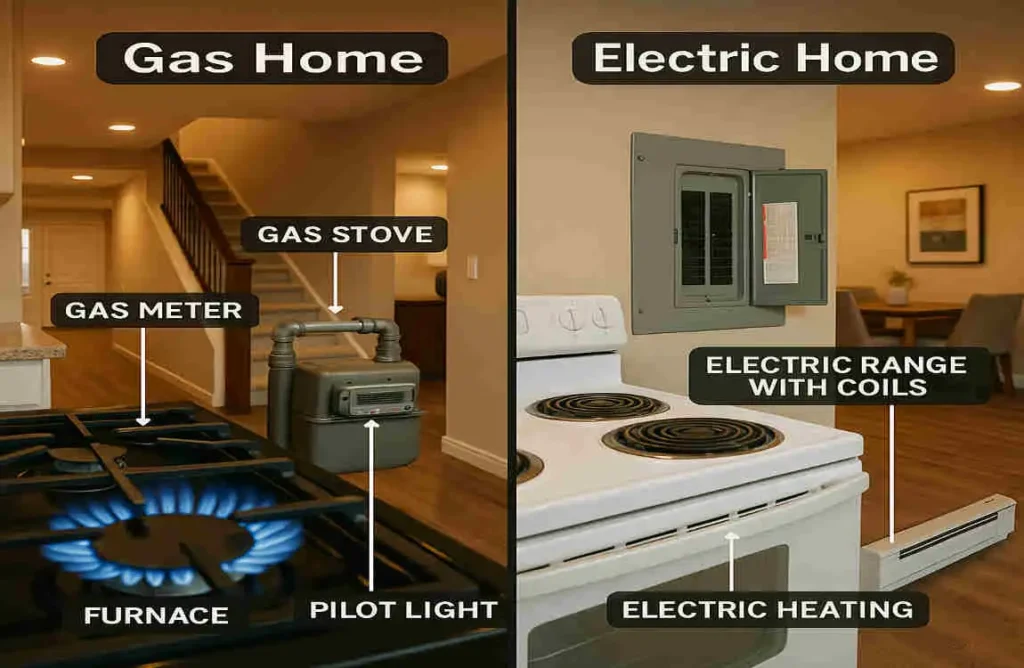Have you ever found yourself asking, “Is my house gas or electric?” You’re not alone! Many homeowners have this question on their minds, and for good reason. Knowing your home’s energy source can make a significant difference in terms of bills, maintenance, safety, and even home upgrades.
Understanding Home Energy Sources

Gas Energy in Homes
When we discuss gas energy in homes, we typically refer to either natural gas or propane. Natural gas is a popular choice because it’s widely available and often more affordable than other energy sources. Propane, on the other hand, is commonly used in rural areas where natural gas pipelines aren’t accessible.
Gas energy is often used for heating, cooking, and powering certain appliances. Many homes have gas furnaces, water heaters, and stoves that rely on this energy source.
Electric Energy in Homes
Electricity is another common energy source found in homes. It’s used for a wide range of purposes, including heating, cooking, and powering appliances. Electric heating systems, such as heat pumps and baseboard heaters, are popular choices for many homeowners.
One of the advantages of electric energy is its versatility. You can use electricity to power almost any appliance or device in your home, from your refrigerator to your smartphone charger.
Gas vs. Electric: Pros and Cons
When comparing gas and electric energy, several key factors should be taken into account. Let’s take a look at some of the pros and cons of each:
Gas Energy
- Pros:
- Often more affordable than electricity
- Can be more efficient for heating and cooking
- Reliable during power outages (if you have a backup generator)
- Cons:
- Requires proper ventilation and safety measures
- It can be more expensive to install and maintain
- It may have a larger carbon footprint than electricity from renewable sources
Electric Energy
- Pros:
- Versatile and can power a wide range of devices
- Easier to install and maintain than gas systems
- It can be more environmentally friendly if sourced from renewable energy
- Cons:
- It may be more expensive than gas in some areas
- It can be less efficient for heating and cooking
- Dependent on the reliability of the electrical grid
Why It Matters
Understanding whether your home uses gas or electric energy is crucial for several reasons. It can impact your monthly bills, the maintenance and safety of your home, and even your ability to make upgrades or switch to a different energy source.
By knowing your home’s energy source, you can make more informed decisions about your energy usage and take steps to improve efficiency and save money.
Why Homeowners Ask “Is My House Gas or Electric?”
There are several common reasons why homeowners find themselves asking, “Is my house gas or electric?” Let’s explore some of these scenarios:
Preparing for Home Renovations or Appliance Upgrades
If you’re planning a home renovation or looking to upgrade your appliances, knowing your energy source is essential. For example, if you want to install a new stove, you’ll need to determine whether it can be connected to a gas line or if you’ll need to opt for an electric model.
Assessing Energy Efficiency and Potential Savings
Understanding your home’s energy source can help you assess its energy efficiency and identify potential savings. For instance, if you have an older gas furnace, you can save money by upgrading to a more efficient model or switching to an electric heat pump.
Planning for Environmental Impact or Switching Energy Sources
If you’re concerned about your home’s environmental impact or considering switching to a different energy source, knowing whether you’re currently using gas or electricity is crucial. You can then research the carbon footprint of each energy source and make an informed decision about the best option for your home.
Safety Concerns Related to Gas Lines and Electric Wiring
Safety is another crucial reason to know your home’s energy source. Gas lines and electric wiring both require proper installation and maintenance to ensure the safety of your home and family. By understanding which energy source you’re using, you can take the necessary precautions and schedule regular inspections.
Simple Ways to Check If Your House Uses Gas or Electricity
Now that we’ve covered the importance of knowing your home’s energy source, let’s explore some simple methods for determining whether your house is powered by gas or electricity.
Check Your Utility Bills
One of the easiest ways to determine whether your home uses gas or electric energy is to review your utility bills. Most utility companies clearly label their services, making it easy to identify which energy source you’re using.
- Where to Find Gas and Electric Charges: Gas and electric charges are usually listed separately on your bill. Look for sections labeled “Natural Gas” or “Electricity” to see which energy source you’re being billed for.
- Understanding How Utility Companies Label Services: Utility companies often use clear labels and descriptions to help customers understand their bills. If you’re unsure about a particular charge, you can usually find more information on the company’s website or by calling their customer service line.
- Tips for Reading Combined Energy Bills: Some utility companies combine gas and electric charges on a single bill. In this case, look for a breakdown of the charges or a separate section for each energy source.
Inspect Your Home’s Appliances
Another way to determine your home’s energy source is to inspect your appliances. Certain appliances, like stoves and water heaters, are often powered by either gas or electricity.
- Gas Appliances: Gas appliances include water heaters, furnaces, and stoves with gas burners. Look for gas lines, pilot lights, or a gas control valve on these appliances.
- Electric Appliances: Electric appliances encompass electric stoves, water heaters, and heating systems, such as baseboard heaters or electric furnaces. Look for power cords, electrical outlets, or breaker switches connected to these appliances.
- Visual Indicators of Gas Appliances: Gas appliances often have visible gas lines or pilot lights. You may also see a gas control valve or a gas meter connected to the appliance.
- Identifying Electric Heating Devices: Electric heating devices, such as baseboard heaters or electric furnaces, are usually connected to a power source via an electrical outlet or a breaker switch. You may also see a thermostat or temperature control panel associated with these devices.
Look for a Gas Meter or Electric Meter
Your home’s energy source can also be determined by the presence of a gas meter or an electric meter. These meters are usually located outside your house or in the basement.
- Locating the Gas Meter: Gas meters are typically found on the side of your house or in the basement. Look for a large, round or rectangular device with a series of dials or digital readouts.
- Recognizing a Gas Meter vs. an Electric Meter: Gas meters and electric meters have distinct appearances. Gas meters typically feature a series of dials or digital readouts, whereas electric meters display a row of digital numbers or a spinning disc.
- Understanding Meter Labels and Indicators: Both gas and electric meters usually have labels or indicators that clearly state their purpose. Look for words like “Natural Gas” or “Electricity” on the meter to confirm which energy source it’s measuring.
Check Your Circuit Breaker and Fuse Box
Your home’s circuit breaker or fuse box can provide valuable information about your energy source, particularly regarding your electric energy usage.
- Identifying Electric Energy Use: Electric appliances and devices are usually connected to the circuit breaker or fuse box. Look for labeled breakers or fuses that indicate the presence of electric heating systems or appliances.
- Presence of Heavy Circuits: Heavy circuits, which are designed to handle high electrical loads, may be an indicator of electric heating systems or appliances in your home. Look for breakers labeled “Heat” or “Electric Heat” to confirm.
- Gas Appliances’ Minimal Impact: Gas appliances typically have minimal impact on the circuit breaker or fuse box, as they don’t rely on electricity for their primary function. However, some gas appliances may have electric components, such as igniters or control panels, that are connected to the breaker box.
Observe Your Home’s Heating System
Your home’s heating system can also provide clues about your energy source. Gas and electric heating systems have distinct characteristics that can help you determine which one you’re using.
- Gas Furnace or Boiler: Gas furnaces and boilers are usually located in the basement or a utility room. Look for a gas line, a pilot light, or a gas control valve connected to the heating system.
- Electric Heat Pump or Baseboard Heater: Electric heat pumps and baseboard heaters are often found throughout the house, usually near exterior walls. Look for power cords, electrical outlets, or breaker switches connected to these heating devices.
- Signs of Energy Type: Other signs that can indicate the energy type fueling your heating system include the presence of a chimney or vent for a gas furnace, or a thermostat or temperature control panel for an electric heating system.
Contact Your Utility Providers
If you’re still unsure about your home’s energy source after trying the above methods, don’t hesitate to contact your utility providers for confirmation.
- How and When to Call: Most utility companies have customer service lines that you can call for assistance. Reach out to your gas and electric providers and ask them to confirm which energy source your home is using.
- Information Utility Companies Can Provide: Your utility providers can provide detailed information about your home’s energy source, including the type of service you’re receiving and any relevant account details. They may also be able to provide historical data or usage information to help you better understand your energy consumption.
Advanced Checks and Confirmations
If you’re looking for more advanced methods to confirm your home’s energy source, consider the following options:
Hiring a Professional Home Inspector or Energy Auditor
A professional home inspector or energy auditor can provide a thorough assessment of your home’s energy source and overall energy efficiency. They can identify any potential issues or areas for improvement and provide recommendations for upgrades or repairs.
Using Smart Home Devices or Energy Monitors
Smart home devices and energy monitors can provide detailed information about your home’s energy usage, helping you identify the specific energy source being used. These devices can track your energy consumption in real-time and provide insights into your energy habits.
Online Databases or Municipal Records
Some municipalities maintain online databases or records that contain information about the energy sources used in local homes. You can access this information through your city or county’s website or by contacting the relevant department.
How Knowing “Is My House Gas or Electric” Impacts Key Decisions

Now that you know how to determine your home’s energy source, let’s explore how this information can impact key decisions related to your home.
Choosing New Appliances
When it’s time to replace or upgrade your appliances, knowing your home’s energy source can help you make the best choice. For example, if you have a gas line in your kitchen, you may opt for a gas stove instead of an electric one. On the other hand, if you’re looking for a more energy-efficient option, choose an electric heat pump over a gas furnace.
Planning Home Energy Upgrades or Switches
If you’re considering upgrading your home’s energy system or switching to a different energy source, it’s essential to know your current energy source. You can then research the pros and cons of each option and make an informed decision based on your needs and priorities.
Budgeting for Home Energy Costs and Tax Incentives
Understanding your home’s energy source can help you better budget for your energy costs and take advantage of any available tax incentives. For example, if you have a gas furnace, you may be eligible for a tax credit if you upgrade to a more energy-efficient model. Knowing your energy source can also help you anticipate and plan for any potential changes in your energy bills.
Preparing for Safety Inspections and Maintenance
Regular safety inspections and maintenance are crucial for ensuring the safety and efficiency of your home’s energy system. By knowing your energy source, you can schedule the appropriate inspections and maintenance tasks, such as checking for gas leaks or testing your electric wiring.
Additional Tips for Energy Source Awareness
As you navigate the world of home energy sources, keep these additional tips in mind:
Signs of Mixed Energy Sources in Homes
Some homes may use a combination of gas and electric energy sources. Look for signs of mixed energy sources, such as a gas stove and an electric water heater, to get a complete picture of your home’s energy usage.
Environmental Impact Considerations
When choosing an energy source for your home, consider the environmental impact of each option. Gas energy, particularly from non-renewable sources, has a larger carbon footprint than electricity from renewable sources, such as solar or wind power.
The Rise of Hybrid Energy Solutions
Hybrid energy solutions, which combine gas and electric energy sources, are gaining popularity. These systems can offer the best of both worlds, providing the efficiency of gas and the versatility of electricity. Stay informed about the latest developments in hybrid energy technology to determine if it’s a suitable option for your home.
